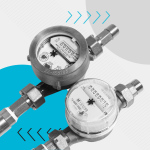
- Has there been a collusion among gas meter suppliers for the domestic gas distribution system operator?
- The President of UOKiK has brought charges to four business entities in that regard.
- Their actions might have exposed the State Treasury, and indirectly all gas consumers, to a loss.
What do you need a “discreet and elegant place off the map” for? This was a description of a hotel made by one of entrepreneurs where representatives of four manufacturers and suppliers of diaphragm gas meters had met. The President of UOKiK checks whether such a place was aimed at concluding a competition-restricting collusion. The meetings might have been used to agree which entrepreneur was to win individual parts of tenders organised by Polska Spółka Gazownictwa [Polish gas distributor]. Four entrepreneurs had charges brought, namely: Apator Metrix from Tczew, Zakład Wytwórczy Urządzeń Gazowniczych Intergaz from Tarnowskie Góry, Fiorentini Polska from Poznań and Elektrometal from Cieszyn. An entity to organise tenders which simultaneously might have been the injured party as a result of the collusion was the domestic gas distribution system operator, that is, Polska Spółka Gazownictwa. The prohibited arrangements might have lasted from 2014 to 2021 during tenders organised regularly by PSG. Diaphragm gas meters are devices used commonly in households, among other things.
– We suspect that the entrepreneurs might have been colluding for seven years which entity was to win specific tenders instead of competing for orders. Their actions might have exposed the domestic gas distribution system operator to a loss or also, indirectly, the State Treasury – says Tomasz Chróstny, the President of UOKiK.
Following the information being in UOKiK’s possession, it may be concluded that entity representatives had met in designated places, such as restaurants or hotels, and communicated via phones or messengers. In practice, the agreement might have been as follows: before every single tender, the entities had declared which part of order they wanted to win and then negotiated which party would obtain the order. There might have been some courtesy offers as well. This means a situation when a business entity does not want to win a tender or its part but they intentionally submit a less favourable offer just to make appearances of competitiveness.
An entrepreneur involved in a competition-restricting agreement faces a risk of a fine of up to 10% of its turnover.
Severe penalties for participation in collusion can be avoided through the leniency scheme. It offers businesses involved in an illegal agreement and managers responsible for entering into a collusion arrangement an opportunity to reduce a sanction or, in some cases, avoid it altogether. It is intended for those who agree to cooperate with the President of UOKiK as a “crown witness” and provide evidence or information regarding the existence of a prohibited agreement. We encourage those interested in the leniency scheme to contact the Office at a dedicated phone number: 22 55 60 555. UOKiK staff will answer any questions about the leniency programme, including anonymous ones.
At the same time, we operate a programme to acquire information from anonymous whistleblowers. Do you wish to inform UOKiK about competition restricting practices? Visit https://uokik.whiblo.pl/ or scan the QR code below and use the simple form. The system we use guarantees complete anonymity, including from UOKiK itself.
Information for the media
| +48 603 124 154 | |
| biuroprasowe@uokik.gov.pl | |
 | pl. Powstańców Warszawy 1 00-950 Warszawa |



















